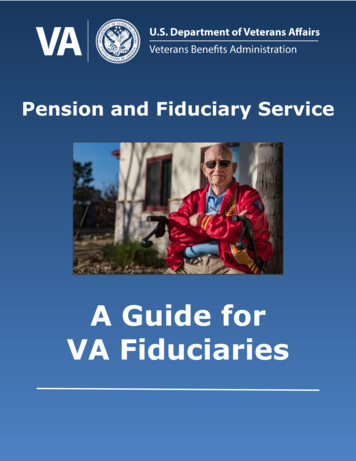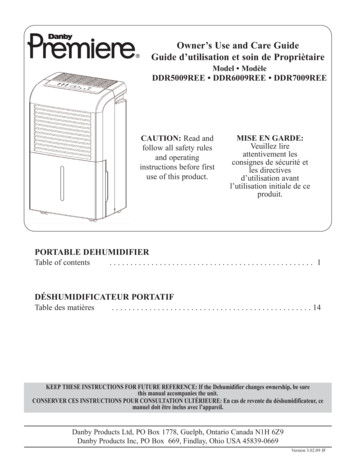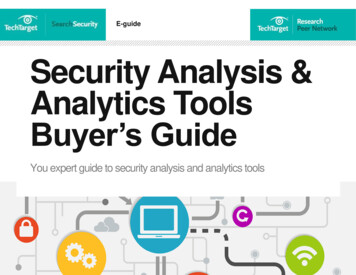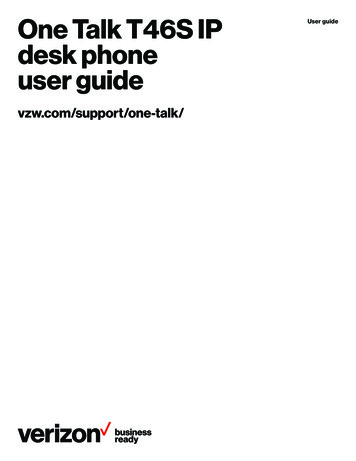
Transcription
Pension and Fiduciary ServiceA Guide forVA Fiduciaries
Table of ContentsIntroduction . 1Key Terms . 2Helping You Manage Your New Responsibility . 3Responsibilities to the Beneficiary . 3Responsibilities to VA . 3Managing Beneficiary Funds . 4Communication with VA . 5Reporting Changes to VA. 6Changes in Beneficiary’s Circumstance . 6Changes in Fiduciary’s Circumstance . 7Communication with the Beneficiary . 8Rights of the Beneficiary . 9Additional VA Benefits the Beneficiary May Be Eligible For . 10Pre-need Burial Plans . 11Death of the Beneficiary . 11Frequently Asked Questions. 12How Can I Use the Beneficiary’s VA Funds?. 12What Is a Retroactive VA Payment? . 12How Can I Use a Retroactive VA Payment? . 12Last UpdatedMarch 2020
How Do I Maintain the Beneficiary’s VA Funds? . 13How May I Invest the Beneficiary’s VA Funds? . 14How Do I Protect the Beneficiary’s VA Funds? . 15Corporate Surety Bond Requirements . 15How Do I Protect VA Funds from the Claims of Creditors? . 16What Records Should I Keep? . 16What Is an Accounting? . 17How Do I Account for the Beneficiary’s VA Funds? . 20How Do I Complete VA Form 21P-4706b, Federal Fiduciary’s Account? . 24Common VA Forms . 29Contact Information . 30Glossary . 31Notes . 32Fiduciary Program Contact . 33Last UpdatedMarch 2020
A Guide for VA FiduciariesPension & Fiduciary ServiceIntroductionVA’s mission is to fulfill President Lincoln’s promise– “To care for him who shallhave borne the battle, and for his widow, and his orphan” by serving andhonoring the men and women who are America’s veterans.The purpose of the Department of Veterans Affairs (VA) fiduciary program is toensure VA benefit payments made to a fiduciary on behalf of a beneficiary areused for the well-being of the beneficiary and the beneficiary’s dependents.Our mission is to protect Veterans and beneficiaries who are unable to managetheir financial affairs.Information in this booklet focuses on the responsibilities of a fiduciary,communication between the fiduciary and beneficiary, rights of a beneficiary,and frequently asked questions.The intent of this booklet is to provide guidance to you, a new fiduciary. It willhelp you to understand your responsibilities, perform your duties, and facilitateopen communication between you and the beneficiaries you serve.Last UpdatedMarch 20201
A Guide for VA FiduciariesPension & Fiduciary ServiceKey TermsBeneficiary – A Veteran, his/her survivor, or adult helpless child, who has beenawarded VA benefits but who is unable to manage his/her VA funds as a resultof injury, disease, the infirmities of advanced age, or being less than 18 years ofage.Fiduciary – An individual or entity that has been appointed by VA to receive VAfunds on behalf of a beneficiary for the use and benefit of the beneficiary andhis/her dependents.Dependent – The beneficiary’s spouse, child, or parent who does not haveenough income to meet his/her needs for personal care and well-being andwho obtains support for such needs from the beneficiary.Relative – An adopted child or a person who is related to a beneficiary by bloodor marriage.Last UpdatedMarch 20202
A Guide for VA FiduciariesPension & Fiduciary ServiceHelping You Manage Your New ResponsibilityResponsibilities to the BeneficiaryAs a fiduciary, you must know what the beneficiary’s needs are so that you candecide how to use the beneficiary’s funds for his/her personal care and wellbeing. Your decision must be based on the beneficiary’s unique circumstances,needs, desires, beliefs, and values. Beneficiaries in the fiduciary program areentitled to the same standard of living as any other individual with similarfinancial resources. You must not use any part of the beneficiary’s VA funds foryour personal use. All funds must be used for the benefit of the beneficiary, orfor the beneficiary’s dependents.It is important that you keep in regular contact with the beneficiary and makesure that he/she always has your current contact information. You should alsomake sure the beneficiary receives proper medical care, to include contactingsocial workers and mental health professionals as necessary.Responsibilities to VAAs a fiduciary, you must notify VA of any changes (see page 6) in thebeneficiary’s circumstances. It is also important that you respond to VA in atimely manner, meet with VA personnel when requested, and comply with ourregulations. Please visit http://benefits.va.gov/fiduciary/references.asp andclick Fiduciary Federal Regulation (38 CFR, Part 13 – Fiduciary Activities) toview our regulations.Last UpdatedMarch 20203
A Guide for VA FiduciariesPension & Fiduciary ServiceManaging Beneficiary FundsAs a fiduciary, you must ensure all of the beneficiary’s bills are sent to you andthat each bill is paid on time. You are also responsible for paying thebeneficiary’s income taxes, when applicable, collecting any rent or unpaiddebts on behalf of the beneficiary, and getting insurance if needed. Asfiduciary, you are required to keep separate financial accounts on behalf of abeneficiary. The law requires a fiduciary to manage and place beneficiary fundsin reasonable, safe investments, protect the funds from creditors and any loss,and provide additional protection when required by VA. (See pages 14, 15, and16 for further information.)Note: The general rule regarding keeping separate accounts does not apply tofiduciaries that are spouses, state/local government entities, certain healthcare facilities, or trust companies or banks with trust powers.Last UpdatedMarch 20204
A Guide for VA FiduciariesPension & Fiduciary ServiceCommunication with VAYou may receive VA-generated correspondence on behalf of the beneficiary. Youmust respond to all requests from VA. The correspondence will describe how andwhen you should respond. VA may request: An accounting of the beneficiary’s funds. (See page 17 for accountingrequirements.) Information to verify the beneficiary’s eligibility for VA benefits. Information used to confirm dependents of the beneficiary. Information to verify school attendance for the beneficiary’s dependents.Last UpdatedMarch 20205
A Guide for VA FiduciariesPension & Fiduciary ServiceReporting Changes to VAChanges in Beneficiary’s CircumstanceAs a fiduciary, you are responsible for reporting important changes in thebeneficiary’s circumstances to VA, such as: Address or phone number Income Medical condition Marriage Divorce Birth or adoption of a child Incarceration Felony conviction Hospitalization Death Changes that show the beneficiary no longer requires a fiduciary. Forexample, the beneficiary knows the amounts and sources of his/herfunds, is able to pay his/her expenses on time, and/or saves money.Last UpdatedMarch 20206
A Guide for VA FiduciariesPension & Fiduciary ServiceChanges in Fiduciary’s CircumstanceYou must also report any changes in your circumstance, such as: Address and phone number Changes that may affect your ability to perform as a fiduciary or if youdecide to stop being a fiduciary. Some reasons you may stop serving as afiduciary for a beneficiary include:o Illnesso Feeling threatened by the beneficiaryo Personal family matterso Felony convictionImportant Note: You must notify VA as soon as possible when you decide youcan no longer serve as fiduciary. You cannot stop being the fiduciary until youreceive notice from VA about the transfer of the beneficiary’s VA funds toanother fiduciary.Last UpdatedMarch 20207
A Guide for VA FiduciariesPension & Fiduciary ServiceCommunication with the BeneficiaryYou must keep open and regular communication with the beneficiary abouthis/her VA benefits. You must provide your current contact information to thebeneficiary. Likewise, you should make sure that you always have thebeneficiary’s current contact information.You must respond to the beneficiary in a reasonable amount of time when youare contacted. The beneficiary must be able to contact you by phone, mail oremail. Also, you must speak with the beneficiary on a regular basis to assesshis/her needs.Changes in the beneficiary’s circumstances may change the beneficiary’seligibility for VA benefits. You may need to help the beneficiary complete formsand/or submit documentation that may affect his/her eligibility to receive VAbenefits. You may also need to address any changes in the beneficiary’scircumstances that at a minimum: May have a positive or negative affect on the amount of his/her VAbenefits; Require an adjustment in how you use VA funds; or May indicate the beneficiary is able to manage his/her own VA funds.Tip: Part of being a fiduciary is helping the beneficiary achieve a quality of lifecomparable to someone with a similar financial situation in the community. Requestsmade by the beneficiary may be granted without prior approval from the fiduciaryhub if they are for the beneficiary’s use and the beneficiary has sufficient funds to payfor the request. Remember to keep your receipts!Last UpdatedMarch 20208
A Guide for VA FiduciariesPension & Fiduciary ServiceRights of the BeneficiaryBeneficiaries in VA’s fiduciary program have rights. These rights include, but arenot limited to, the right to be notified when VA appoints a fiduciary and toappeal that appointment to the Board of Veterans’ Appeals. The beneficiarymay also request that VA replace the current fiduciary with a new fiduciary.The beneficiary has a right to the fiduciary’s name and current contactinformation. The beneficiary has a right to contact the fiduciary to requestfunds, account balance information, a copy of the fiduciary’s VA-approvedaccounting, and other information or assistance consistent with theresponsibilities of a fiduciary.The beneficiary also has a right to request removal from the fiduciary programand direct payment of VA funds.Last UpdatedMarch 20209
A Guide for VA FiduciariesPension & Fiduciary ServiceAdditional VA Benefits the Beneficiary May Be Eligible ForThe beneficiary’s disability may prevent him/her from seeking information fromVA or understanding information provided by VA. In order to assist thebeneficiary, it is important that you have a general understanding of VAbenefits. Some of the more common VA additional benefits include: Aid and Attendance (A&A) – Additional benefits for a Veteran orsurviving spouse:o Who requires the aid of another person in order to performpersonal functions required in everyday living; oro Who is a patient in a nursing home due to mental or physicalincapacity; oro Who is blind or meets other specific visual requirements. Housebound – Additional benefits paid for a Veteran or surviving spouse:o Who is confined to his/her immediate premises because ofpermanent disability; oro Who has one disability rated at 100 percent, plus other disability(ies)separately rated at 60 percent or more. Dependency – Additional benefits paid to certain adult beneficiaries whohave a dependent spouse, child, or parent. For example, if thebeneficiary marries, the new spouse is a dependent and the beneficiarymay qualify for additional benefits.Note: Please visit www.va.gov for additional information on VA benefits.Last UpdatedMarch 202010
A Guide for VA FiduciariesPension & Fiduciary ServicePre-need Burial PlansA VA fiduciary may use a beneficiary’s VA funds to make deposits into orpurchase a pre-need burial plan or burial insurance if you determine that it is inthe best interest of the beneficiary to have such a plan or insurance. The preneed burial plan should be registered in the beneficiary’s name and madepayable to the service provider.Death of the BeneficiaryThe beneficiary is not entitled to VA benefits for the month in which he/shedies, even if the individual dies on the last day of the month. Therefore, unlessyou are the beneficiary’s spouse, you must return these funds immediately toVA.Any saved VA benefits belong to the beneficiary’s estate and must generally begiven to the legal representative of the beneficiary’s estate. You may contactthe probate court or an attorney for further information.If the beneficiary dies without a will or heirs, you must return any remaining VAfunds to VA. You may contact your fiduciary hub of jurisdiction for furtherinformation. (See page 31 for contact information.)Reminder: Please report the death of a beneficiary as soon as possible! If abeneficiary is paid for time when they are deceased an overpayment may existthat you can be liable for as fiduciary.Last UpdatedMarch 202011
A Guide for VA FiduciariesPension & Fiduciary ServiceFrequently Asked QuestionsHow Can I Use the Beneficiary’s VA Funds?Your main responsibility is to manage the beneficiary’s VA funds to meet theneeds of the beneficiary. First, use VA funds to pay the expenses that meet thebasic needs of the beneficiary and his/her dependents, such as rent ormortgage payments, utilities, or groceries. You must make all payments eitherby check or electronic bill payment from the fiduciary account. ATMwithdrawals, counter withdrawals, and checks made payable to cash are notacceptable transactions.You may use any remaining VA funds to provide the beneficiary and his/herdependents the best possible standard of living that VA funds will reasonablyallow, such as new furniture, a new car, or a vacation.You cannot borrow or make loans from the beneficiary’s VA funds and youmust not use any part of the beneficiary’s VA funds for your personal use. As afiduciary, you have been entrusted to use all VA funds for the benefit of thebeneficiary and his/her dependents. If you do not meet this responsibility, youmay be removed as fiduciary. VA may also investigate any misuse of the fundsto determine whether you owe a debt to the Government and whether thematter should be referred for further investigation.What Is a Retroactive VA Payment?Approval of VA claims may take some time or VA may approve an effective dateof payment prior to the actual date of receipt of a claim for benefits. Thiscreates a retroactive payment of funds which is paid in a lump-sum.How Can I Use a Retroactive VA Payment?You must first use any retroactive VA funds to pay the expenses that meet thebasic needs of the beneficiary and his/her dependents, such as rent and food.You may use any remaining retroactive VA funds to pay for better health careLast UpdatedMarch 202012
A Guide for VA FiduciariesPension & Fiduciary Serviceor allow the beneficiary and his/her dependents to enjoy a standard of livinglike other people who have a similar amount of money.How Do I Maintain the Beneficiary’s VA Funds?As a fiduciary, there are rules you must follow when managing the beneficiary’sVA funds: You must keep VA funds in an account in a federally insured bank orcredit union. You must have VA funds direct-deposited into the account. You must establish the account in the beneficiary’s name and your nameand identify the fiduciary relationship. The title of the account will showthe beneficiary has ownership of, but not access to, VA funds. Forexample:1. (Beneficiary’s Name), by (Your Name), Fiduciary (Your Name), Fiduciaryfor (Beneficiary’s Name)Your bank or credit union can answer any questions that you may haveabout this requirement. Other acceptable fiduciary payee types on the account may include, butare not limited to: Legal Custodian, Federal Fiduciary, Guardian,Representative Payee, or Rep Payee. You must keep the beneficiary’s VA funds in an account separate fromyour funds or anyone else’s funds. However, the general rule aboutkeeping a separate account does not apply to the following fiduciaries:o Spouseso State or local government entitiesLast UpdatedMarch 202013
A Guide for VA FiduciariesPension & Fiduciary Serviceo Institutions, such as public or private medical care facilities, nursinghomes, or other residential care facilities, when an accounting is notrequiredo Trust company or bank (financial institution) with trust powersorganized under the laws of the United States or a State, who is alsothe financial institution holding the funds, and is FDIC or NCUAinsured.Note: In order to keep the funds secure, do not give the account number to thebeneficiary. You must also safeguard all passwords.How May I Invest the Beneficiary’s VA Funds?An investment must be reasonable, safe, and in the best interest of thebeneficiary. As fiduciary, you are only allowed to invest the beneficiary’s VAfunds in interest or dividend-paying accounts that are insured under Federallaw or in U.S. Savings Bonds.A properly registered savings bond can only be cashed in with writtenauthorization from VA. U.S. Savings Bonds must be registered as follows:2. (Beneficiary’s Name), (Beneficiary’s Social Security Number), undercustodianship by designation of the Secretary of Veterans AffairsThe general rule about investment of VA funds does not apply to spousefiduciaries.Note: VA funds paid to the chief officer of an institution in which thebeneficiary is being furnished hospital treatment or institutional, nursing, ordomiciliary care may not be invested.Tip: Wait until you receive your Fiduciary Appointment letter and use that to opena properly titled account on behalf of the beneficiary to safeguard VA funds youmanage!Last UpdatedMarch 202014
A Guide for VA FiduciariesPension & Fiduciary ServiceHow Do I Protect the Beneficiary’s VA Funds?If you manage more than 25,000 in VA funds for the beneficiary, VA willrequire you to guard the beneficiary’s funds by purchasing and maintaining acorporate surety bond. The bond replaces the beneficiary’s funds if you commitfraud or if you waste or misuse the beneficiary’s funds.Corporate Surety Bond RequirementsAn individual corporate surety bond provides the most secure protection of thebeneficiary’s funds. A surety bond company provides insurance that protectsthe beneficiary’s funds. As long as you are the fiduciary and continue to pay thebond premiums, the beneficiary’s funds are protected up to the face value ofthe bond. You are authorized to deduct the cost of a surety bond from thebeneficiary’s VA funds. VA personnel periodically contact the bonding companyto make sure the surety bond is in effect and the information is current. Asurety bond must be made payable to:3. The Secretary of Veterans Affairs for the use and benefit of (Beneficiary’sName).The surety bond must include the following information: The amount of the bond; The names of the fiduciary and beneficiary; The name of the surety bond company; and Affirmation from the surety bond company that they will pay the bond.Last UpdatedMarch 202015
A Guide for VA FiduciariesPension & Fiduciary ServiceThe general rule about obtaining a corporate surety bond does not apply to thefollowing fiduciaries: Spouses A fiduciary that is a trust company or a bank with trust powers organizedunder the laws of the U.S. or a state A fiduciary in the Commonwealth of Puerto Rico, Guam, or any otherterritory of the U.S., or in the Republic of the Philippines, whose locationprecludes adequate bonding and has a restricted withdrawal agreementin lieu of a corporate surety bondHow Do I Protect VA Funds from the Claims of Creditors?In addition to protecting the beneficiary’s VA funds from misuse, you must alsoprotect the funds from the claims of creditors. No one can make claims on VA funds except the Internal RevenueService. A fiduciary may pay a creditor if the beneficiary has VA funds to pay thecreditor, but VA funds should first go to pay for the beneficiary’s basicneeds. Consult with VA on any claim on the beneficiary’s VA funds.What Records Should I Keep?You are responsible for keeping accurate records of the beneficiary’s VA funds.You should keep detailed records of all payments. Keep the following types ofrecords: Bills – Rent/Mortgage statements, utilities, cable, credit card, medical,vehicle, insurance, etc.Last UpdatedMarch 202016
A Guide for VA FiduciariesPension & Fiduciary Service Receipts – Payments made on behalf of the beneficiary and his/herdependents for items such as groceries, clothing, appliances, vehiclerepairs, home repairs, etc. Financial Statements – Bank statements for the accounts into which VAfunds are deposited. VA Forms – Forms used for initial application or changes to fiduciary orbeneficiary status (example VA Form 21P-4703, Fiduciary Agreement). Correspondence from VA – Fiduciary appointment documents, approvedaccounting forms, dependency verification notices, requested paymentof debt letters, etc.Note: You may choose to scan the records and maintain them electronically.Also, many banks now offer electronic statements that can be saved oncomputers and printed, when needed.What Is an Accounting?You may have to submit an accounting to VA, in which you will provide detailsabout the VA funds you manage for the beneficiary. We may require you toaccount for the beneficiary’s VA funds at any time, so it is important for you tokeep good records. Accounting DefinitionAn accounting is your written report about the funds you manage for thebeneficiary. The accounting covers a length of time set by VA, typicallyone year. An accounting consists of the following:o Beginning account balanceo Funds you manage for the beneficiaryo Expenses paid from the funds you manage for the beneficiaryo Ending account balanceLast UpdatedMarch 202017
A Guide for VA FiduciariesPension & Fiduciary Service Accounting PeriodAccounting periods are generally scheduled at regular intervals, usuallyevery year. VA will let you know in writing about the accounting period,which is usually the anniversary date of your appointment as fiduciary forthe beneficiary. Accounting Due DateThe accounting is due within 30 days after the end of the accountingperiod. For example, if the accounting period is from June 1, 2013 toMay 31, 2014, the accounting is due no later than June 30, 2014. Thisallows you enough time to review receipts, prepare the accountingforms, and obtain all financial documents for the entire accountingperiod.If you do not submit a timely accounting, VA may:o Temporarily stop benefit paymentso Appoint a new fiduciaryo Investigate whether you have misused fundsIf there is a misuse investigation, you may have to answer questions andprovide evidence. A misuse investigation is unlikely if you submitaccurate accountings on time. Accounting FormsYou must submit a complete accounting for review. A completeaccounting includes the following documents:o VA Form 21P-4706b, Federal Fiduciary’s Account (see page 23 forsample form)o Original or unaltered copies of statements from the bank for theentire accounting periodLast UpdatedMarch 202018
A Guide for VA FiduciariesPension & Fiduciary ServiceYou must sign and date VA Form 21P-4706b, Federal Fiduciary’s Account.You must also sign and date any attachments to VA Form 21P-4706b,Federal Fiduciary’s Account. Only one VA Form 21P- 4706b, FederalFiduciary’s Account, should be completed for the entire accountingperiod.Note: In certain cases, VA will accept an abbreviated accounting to show howyou used any retroactive VA funds. You may contact your fiduciary hub ofjurisdiction for further information.Last UpdatedMarch 202019
A Guide for VA FiduciariesPension & Fiduciary ServiceHow Do I Account for the Beneficiary’s VA Funds? Report FundsYou must report all funds you manage on behalf of the beneficiary inSection 1 on VA Form 21P-4706b, Federal Fiduciary’s Account. You shouldnot report any funds you do not manage as the beneficiary’s fiduciary.Examples of types of funds you may manage for the beneficiary include:o VA fundso Social Security Administration (SSA) fundso Private retirement fundso Military retirement payo Rental property fundso InterestLast UpdatedMarch 202020
A Guide for VA FiduciariesPension & Fiduciary Service Report ExpensesYou must report all payments made from the funds managed on behalfof the beneficiary in Section 2 of VA Form 21P-4706b. Include paymentsfor rent, utilities, food, clothing, transportation, surety bond premiums,etc. Verify AssetsThe ending balance on VA Form 21P-4706b must be the same as thebalance on all bank statements as of the ending date of the accountingperiod (minus any outstanding transactions). Accounting AssistanceYou will find an electronic version of VA Form 21P-4706b to assist you inpreparing the accounting s.asp.You may also contact your fiduciary hub of jurisdiction for personal assistance bycalling toll-free at 1-888-407-0144.Last UpdatedMarch 202021
A Guide for VA FiduciariesPension & Fiduciary ServiceLast UpdatedMarch 202022
A Guide for VA FiduciariesPension & Fiduciary ServiceLast UpdatedMarch 202023
A Guide for VA FiduciariesPension & Fiduciary ServiceHow Do I Complete VA Form 21P-4706b, Federal Fiduciary’s Account? From – Enter your name and complete address. To – Enter the address of the fiduciary hub. It is on the letter youreceived from VA advising you of the need for an accounting. Name of Veteran – Enter the full name of the Veteran. Name of Beneficiary – Enter the full name of the beneficiary, if theperson entitled to VA funds is someone other than the Veteran. VA File Number – Enter the claim number or Social Security Number ofthe Veteran. You can find the number required in the top, right-handcorner on letters you receive from VA. Accounting Period “From” – The accounting period should be on thenotification letter you received from VA. Accounting Period “To” – The accounting period should be on thenotification letter you received from VA.1. MONEY RECEIVEDA. Total Estate at Beginning of Period – Enter 0, if this is the firstaccounting. If this is not your first accounting, enter the amount noted asthe ending balance on your previous accounting.B. Amount Received from VA – Enter the number of months and themonthly amount of VA funds you managed on behalf of the beneficiaryduring the accounting period. Also, enter the amount of any retroactiveVA funds received during the accounting period. If the monthly amountsvaried more than twice, you may enter additional amounts received fromVA in lines 1E thru 1H. Additional space is also available in block 6, or youmay attach additional sheets to the accounting. You must sign and dateall sheets you attach to the accounting.Last UpdatedMarch 202024
A Guide for VA FiduciariesPension & Fiduciary ServiceC. Amount Received from Social Security – Enter the number of months andthe monthly amount of the SSA funds you managed on behalf of thebeneficiary during the accounting period. Only enter these funds if theSSA recognizes you as the representative payee on behalf of thebeneficiary.D. Interest Earned on Deposits – Enter the amount of interest receivedduring the entire accounting period for funds deposited in a bank.E-H. Amount Received from Other Sources (List Items in 1E thru 1H) – Enterthe amount of funds from other sources you managed on behalf of thebeneficiary during the accounting period. Only enter these funds if youare recognized as the fiduciary on behalf of the beneficiary for this othersource of funds.I. Total Received (Add Lines 1A thru 1H) – Enter the total of lines 1A thru 1Hto include any funds listed on additional sheets. This is the total amountof funds you managed on behalf of the beneficiary during the accountingperiod as fiduciary. Compare this fund information to the bankstatements to ensure all funds were properly reported on VA Form 21P4706b.2. MONEY SPENT
not limited to, the right to be notified when VA appoints a fiduciary and to appeal that appointment to the Board of Veterans’ Appeals. The beneficiary may also request that VA replace the current fiduciary with a new fiduciary. The beneficiary has a right











